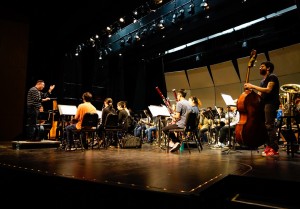Take Yo-Yo Ma, Gustavo Dudamel and Lang Lang – combine them and multiply by two.
Now you have the cultural presence of Leonard Bernstein, said Travis Cross, the conductor of the UCLA Wind Ensemble and Department of Music chair.
In its first concert of the year, entitled “Mostly Bernstein: Westside West Side,” the UCLA Wind Ensemble will celebrate the centennial birth year of the late Leonard Bernstein, an American composer, conductor and pianist of the 20th century, Cross said. The performance will take place Friday, honoring Bernstein with a program that includes his scores for the Broadway productions “West Side Story” and “Candide.” Bernstein’s work was originally written for a full orchestra, but Friday’s performance will feature versions repurposed for wind ensembles, Cross said. The revised renditions highlight sounds from each instrument in the ensemble and showcase Bernstein’s versatile musicianship, Cross said.
“(Bernstein) played a more central role in American life than any classical musician alive today,” Cross said. “If you ask 100 musical theater artists in America, ‘What’s the most important musical of all time?’ more than 50 of them would say ‘West Side Story.’”
The concert will begin with “Overture” from “Candide,” continue with various tunes from “Symphonic Dances from ‘West Side Story,’” and end with “Make our Garden Grow,” which is also from “Candide.” “West Side Story” is Bernstein’s most famous work, Cross said, while “Candide” was not as much of a commercial success but has become a classic in the repertoire for orchestras and wind ensembles. “Make our Garden Grow” ends with a full sound with triumphant ringing, Cross said.

Bernstein’s works helped define the category of American classical music, said Jonathan Tompkins, a graduate master of music student in trumpet performance and trumpeter in the ensemble. In the 1700s and 1800s, the majority of renowned classical works were completed by European musicians in European styles. People were seeking an individual, distinctive American music style, Tompkins said, the first of which was rock ‘n’ roll. Bernstein, who lived in New York in the early 1950s, was surrounded by the rock ‘n’ roll genre, in addition to blues and other music styles. His musical environment translated into his compositions, with hints of the traditional Brazilian genre and dance samba finding its way into the “West Side Story” score.
“I really love playing it, because those are American melodies,” Tompkins said. “They were back then in the ’50s, and because Bernstein put them into his work, they’ve just been totally solidified.”
The musicals’ soundtracks highlight Bernstein’s individual style as a classical musician, Cross said. Bernstein completed his musical training at the Curtis Institute of Music and Harvard University and had a background as a classical composer, yet he infused his composition for the musicals with elements of jazz and Latin dance music, Cross added. In “Mambo” from “Symphonic Dances from ‘West Side Story,’” a raucous, upbeat tune, the ensemble will yell “Mambo!” between various melodies, Cross said, and the audience is welcome to join.
The arrangement also includes the cha-cha, and Bernstein balanced these genres with jazz, contemporary and classical melodies by utilizing intricate rhythms, Cross said. “America” from “West Side Story” is penned in 6/8 time signature, but every other bar of the music comes with a shift in strong beats and accented notes, referred to as a hemiola. Bernstein was one of the first musicians to incorporate hemiolas into his compositions, Cross said, sewing syncopation into classical music.
While Bernstein’s compositions for Broadway were meant to be performed by the classical musical theater pit, a full orchestra with both string and wind instruments, this concert will feature wind players and no string sections, hence the transcription of Bernstein’s original arrangement to the modified version being performed Friday.
Part of what makes Bernstein’s compositions so interesting is the variety between instrumentation – and players of each instrument are featured at some point. Different instruments get the chance to shine in the program, Cross said. In the overture to “Candide,” there are other various quirky features in the piece, including offbeat rhythms from the lower-pitched instruments, balanced by a moment where a melody of the piccolo plays out of nowhere, said Layla Stefanacci, a second-year music performance student and oboist in the ensemble.
Stefanacci said in the “Somewhere” section of “Symphonic Dances from ‘West Side Story,’” the original piece includes a segment for a string quartet, but when written as a band quartet, begins with the English horn, followed by the flute, bassoon and then oboe. Toward the end of the symphonic dances, Stefanacci said one of her favorite moments in the performance is when she gets to solo and play a high F – one of the highest notes on her oboe – accompanied by the second oboe.
“A lot of times, in orchestra pieces, you have very string-heavy stuff, and then the winds rest nearly 100 measures, and then we’ll play like one note that has to be perfect, and then we’ll rest,” Stefanacci said. “(For this concert), every part … we all have to do all the crazy runs, all the crazy stuff in the middle, we all have to do it.”
Bernstein’s compositions constitute the majority of the program, but the ensemble will also perform “Sheltering Sky” by John Mackey and “Early Light” by Carolyn Bremer from the Cal State Long Beach composition faculty, who passed away in September. Bremer’s “Early Light” is an homage to baseball and captures a sense of Americana. Her compositions complement Bernstein’s, Cross said, as they were both contemporary American musicians.
“Leonard Bernstein was the most iconic American musician of the 20th century,” Cross said. “(Bernstein) just kind of did everything, and a lot of what we play is his music – he left this legacy of incredible music that we play, but one of the reasons he became really famous was because he was this star conductor.”
